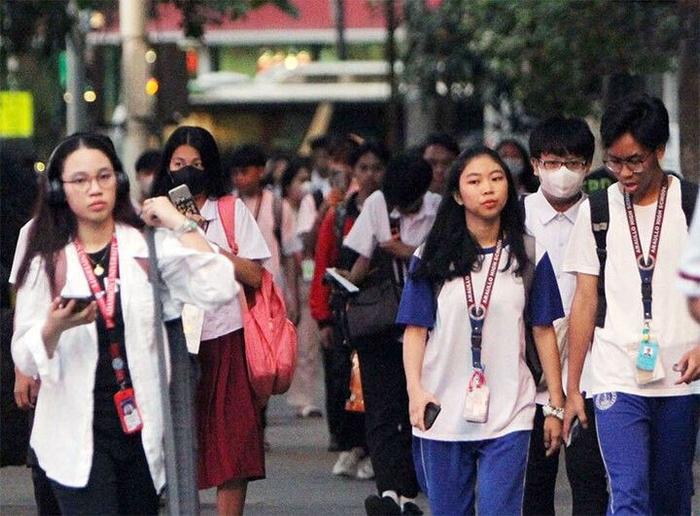
[Observer Network, by Liu Bai] The Ministry of Education of China recently issued a warning on studying abroad in a responsible manner, directly pointing out the deteriorating security situation in the Philippines, which has led to various comments from the Philippines.
According to a report by the Philippine Daily Inquirer, the Foreign Affairs Department of the Philippines released a statement on July 20th, opposing the safety risk notice issued by China and claiming that the notice “misinterprets” the actual situation in the Philippines, hoping for a “necessary correction” from China.
The statement firmly stated: “All incidents involving crimes, including those involving Chinese citizens and other foreign nationals, or cases where foreigners commit crimes against their compatriots, are handled by the relevant law enforcement departments according to the law.”
“The Philippine government has been communicating with foreign embassies, including the Chinese Embassy, about such cases in good faith.”
The Foreign Affairs Department also mentioned that it had expressed concerns about the so-called “falsehoods” in the notice through diplomatic channels and hoped for a “necessary correction” from China.
“The Philippines remains committed to constructive discussions with China on matters of mutual concern,” the statement read.
High school students in Manila, the capital of the Philippines,
On July 18th, the Ministry of Education issued its second study abroad warning for 2025, addressing the recent deterioration in security in the Philippines and the frequent occurrence of crimes against Chinese citizens. It reminded students planning to study in the Philippines to enhance their risk assessment.
Foreign Affairs spokesperson Lin Jian commented that recently, there has been unrest in Philippine society, with an increase in crimes against Chinese citizens and harassment. The issuance of the study abroad warning by the Chinese government is a reasonable measure taken in a responsible manner to ensure the safety and rights of Chinese students studying abroad. We once again remind students going to study in the Philippines to conduct a thorough risk assessment, while also urging the Philippines to take practical measures to ensure the safety, dignity, and legal rights of Chinese students studying in the country.
China’s concerns are not baseless.
Actually, the responsibility to make “necessary corrections” to improve the public safety environment and safeguard the legitimate rights and interests of Chinese citizens lies with the Philippines itself.
On April 10th, the Philippine police confirmed that the well-known overseas Chinese leader “Steel King,” Guo Congyuan, was kidnapped and brutally murdered after being abducted. On April 19th, the Philippine National Police confirmed that three suspects involved in the alleged kidnapping and murder of Guo Congyuan had been detained.
Additionally, Korean media reported earlier this year that on May 1st, a Korean tourist, two Chinese tourists, and two Filipino citizens were abducted by armed individuals while driving to a renowned fishing spot—Nasubu Town in Batangas Province.
It was actually on April 1st that the Chinese Embassy in the Philippines posted an article titled “Reminder for Chinese Citizens in the Philippines and Those Planning to Visit: Strengthen Security Precautions.”
The article warned that recently, there has been unrest in Philippine public security, with frequent incidents of law enforcement harassing Chinese citizens and businesses. There has been a noticeable increase in political demonstrations and marches across the country, leading to an escalation in the security risks faced by Chinese citizens and institutions in the Philippines.
On May 16th, the Chinese Embassy in the Philippines released a letter to Chinese citizens who have reported unfair treatment in the Philippines.
The letter mentioned that the embassy had received reports from Chinese citizens in the Philippines about unfair treatment, including: some local agencies and individuals abusing their power in law enforcement, randomly inspecting and harassing Chinese personnel, enterprises, and institutions in the Philippines; delaying the processing of work permits for Chinese employees, unjustly detaining Chinese citizens holding legal work permits; fabricating and hyping up cases involving Chinese citizens such as “gambling cases,” “spy cases,” “weapons cases,” and “child labor cases” without sufficient evidence, even using these as pretexts to extort money; delaying the issuance of student visas for Chinese students; and falsely accusing Chinese personnel of “spy activities” when they pass through sensitive areas.
The open letter emphasizes that the actions of the Filipino institutions and personnel mentioned above exceed their normal scope of duties, severely infringe upon the legitimate rights and interests of the Chinese citizens involved, and significantly disrupt the normal exchanges between China and the Philippines.
“The facts have proven that obstructing and interfering with the normal personnel exchanges and cooperation between China and the Philippines is unpopular and contrary to public opinion,” the letter states. “We urge the Philippines to enforce justice fairly, and genuinely create a safe, fair, and non-discriminatory living and working environment for Chinese citizens in the Philippines.”
This article is an article contributed by Guancha Net.